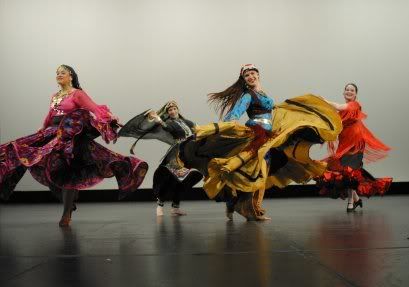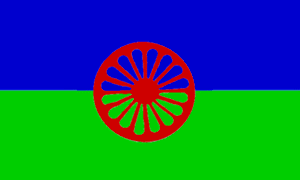
Linguistic and genetic evidence indicates the Romanies originated from the Indian subcontinent, emigrating from India towards the northwest. The Romani are generally believed to have originated in central India, possibly in the modern Indian state of Rajasthan, migrating to northwest India (the Punjab region) around 250 B.C. In the centuries spent here, there may have been close interaction with such established groups as the Rajputs and the Jats. Their subsequent westward migration, possibly in waves, is believed to have occurred between 500 A.D. and 1000 A.D. Contemporary populations, suggested as sharing a close relationship to the Romani are the Dom people of Central Asia and the Banjaras of India.
the Gypsy Route (click to enlarge) :

The emigration from India likely took place in context of the raids by Mahmood Ghazni. As these soldiers were defeated, they were moved west with their families. While the South Asian origin of the Romani people has long been established, the exact South Asian group from whom the Romanies have descended has been a matter of debate. The recent discovery of the Jat mutation that causes a type of glaucoma in Romani populations suggests that the Romani people are the descendants of the Jat people found in Northern India.

Pundela, a Rajasthani song of longing for one's beloved, has been a virtual anthem for Roma music, all over the world. The lyrics roughly translated into English, go like this :
I think of you, Pundela my love,
I told you not to go to abroad,
But you wanted to go to earn some money,
You did not understand that happiness lay here,
With your mother, father, sisters, brothers,
and me who loves you.
We wanted to stop you going, because we needed you,
But you did not listen to us,
Now you have returned, but you are dead,
How can I live without you ?
I miss you, Pundela my love.
Musafir (Rajasthan) : (Download)
Dil Mastana (Rajasthan) : (Download)
Ando Drom (Hungary) : (Download)
Mitsoura (Hungary) : (Download)
Thierry 'Titi' Robin (France) & Gulabi Sapera (Rajasthan) : (Download)

The World Romani Union has adopted a Romani flag which is recognized by all the Roma, the world over. It comprises of blue and green traditional colors with the red Ashok Chakra in the center (adopted from the Indian flag, but with 16 spokes). Blue is for the sky and the heavens. Green is the land, organic and growing. The Ashok Chakra in the center symbolizes movement and progress.



4 comments:
This is superb stuff
Thank you.
Thank You. This is soooo great. Jippie! I love the internet for giving people the possiblity to share their great knwoledge with me.
Thank you for the beautiful translation of Pundela. These words are very touching...
Post a Comment